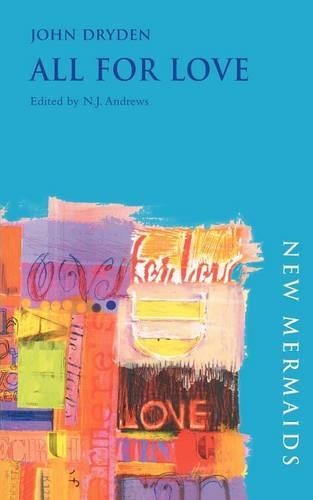
All for Love
(Paperback)
Publishing Details
All for Love
By (Author) N.J. Andrew
By (author) John Dryden
Bloomsbury Publishing PLC
Methuen Drama
1st August 2004
United Kingdom
Classifications
Tertiary Education
Non Fiction
Literary studies: plays and playwrights
Literary studies: general
822.4
Physical Properties
Paperback
160
Width 129mm, Height 198mm
300g
Description
All for Love or, The World Well Lost is John Dryden's 1677 adaptation of the tragedy of Antony and Cleopatra into a neo-classical quintet with supporting voices: After Cleopatra's desertion of Antony at the battle of Actium, not only his wife Octavia but also his general Ventidius and his friend Dolabella strive to win him over to their side. Antony, torn between the claims of duty, friendship, dignity and love, despairs when he hears the rumour of Cleopatra's death, which is not, as in Shakespeare's version, spread by the queen herself but by her deceitful eunuch. This edition includes Dryden's dedication of the play to the Earl of Danby and his preface, in which he defends against French neo-classicist strictures the liberties he took with his sources; it further discusses the play's austere power in the theatre, which is unjustly considered to be inferior to Shakespeare's quite distinct version of the story.
Author Bio
John Dryden (1631-1700) was an English poet, critic and dramatist, responsible for nearly 30 plays. He was noted both for his elegant comedies and his heroic verse dramas, which introduced the principles of French neoclassicism to England. Dryden turned to drama following the reopening of the theatres at the Restoration; his first attempt, the comedy The Wild Gallant, was presented in 1663 at Drury Lane. The success of his heroic drama The Indian Emperor established him as a leading playwright. Following Aureng-Zebe (1675), perhaps his best heroic work, Dryden abandoned the use of rhyming couplets, producing the oft-revived blank-verse tragedy All for Love (a retelling of Shakespeare's Antony and Cleopatra) in 1677. Dryden was the first to write drama criticism in an informal modern style and the first to attempt a history of English drama in his essay Of Dramatick Poesie (1668). He eventually tired of playwriting and his final plays, such as the tragicomedy Love Triumphant (1694), were written to relieve financial problems after his fortunes fell with the abdication of James II.
